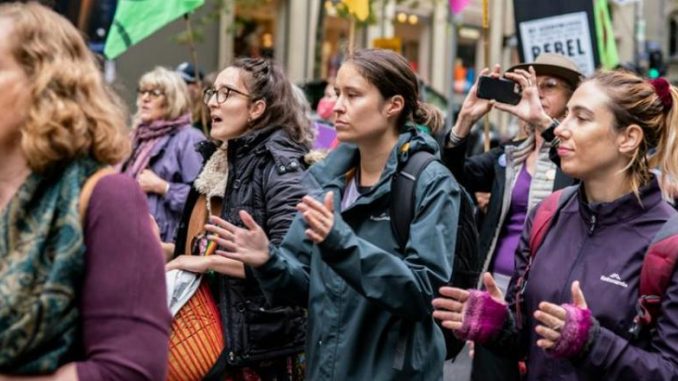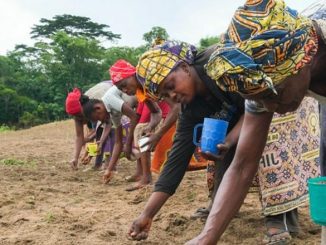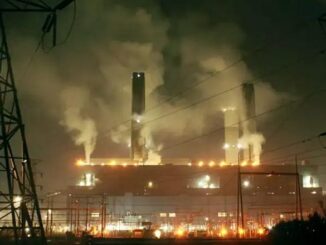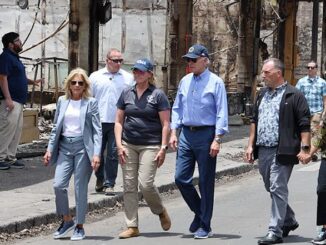
WASHINGTON, DC, March 8, 2021 (ENS) – “Simply put, our world does not yet work for women as it should,” Vice President Kamala Harris today told the European Parliament on the occasion of International Women’s Day, marked annually on March 8. The first woman in U.S. history elected to the vice presidency, Harris said, “As we endure the pandemic, the economic instability, the racial injustice, the threats to democracy, and the effects of climate change, the question before us is simple. How do we build a world that works for women?”
“I believe we must ensure women’s safety at home and in every community,” said Harris, a former California attorney general, in her pre-recorded video message.

“We must ensure that women can access high-quality healthcare, and that those health needs particular to women are addressed. We must treat women with dignity at work, and put in place the structures needed so that women can both care for their families and excel in the workforce. Finally, we must give women equal voice in decision-making, for this is essential to free and fair democracies,” Harris said.
“And this is not just an act of goodwill. This is a show of strength,” she declared. “If we build a world that works for women, our nations will all be safer, stronger, and more prosperous. This International Women’s Day, let us be determined in this effort. Let us be united in this effort.”
The event ended with a speech by European Commission President Ursula von der Leyen of Germany, who said, ‘‘Too many women in Europe lack the fundamental opportunity to work and earn a living. Today, the employment rate for women is 67%, while that of men is 78%. This is simply not acceptable. Last week, we set a new target for Europe – we must cut the gender employment gap by half…”
“The Commission requires that all member states put women at the centre of their post-COVID-19 recovery plans. It will only be a true recovery if these plans are for all,” von der Leyen concluded.
UN Secretary-General António Guterres is pleased to see Vice President Harris and President von der Leyen in office. When women are in governments, in parliaments or in peace negotiations, governments create better social protection programs, stronger climate policies and more enduring peace agreements, Guterres said today in his International Women’s Day message.
“Whether running a country, a business or a popular movement, women are making contributions that are delivering for all and driving progress towards the Sustainable Development Goals, SDGs,” Guterres said. “I call on countries, companies and institutions to adopt special measures and quotas to advance women’s equal participation and achieve rapid change.”
But the state of affairs for the world’s women is precarious as the global coronavirus pandemic persists.

Because of long-ingrained gender inequalities, the secondary impacts of COVID-19 have not only led to substantial increases in reports of gender-based violence but seen more women lose their jobs than men, spotlighted the unequal impacts of unpaid caregiving on women and girls, and left 20 million girls at risk of not returning to school.
As people are stressed beyond endurance, gender violence erupts more frequently than usual during the pandemic. And the victims often have nowhere to turn for help. Fifteen million people in need, mostly women and girls, are currently left out of funding for gender-based violence protection and recovery services, finds a new analysis from the International Rescue Committee, a New York-based nonprofit group active in more than 40 countries and 20 U.S. cities.
Across the 10 humanitarian response plans available for 2021, the average gender-based violence funding request is only three percent of the total needed, with less than $11 allocated per person in need of support, the IRC reports.
“We know that crises of any kind impact women and girls differently,” said Nicole Behnam, the IRC’s senior director for violence, prevention and response. Behnam says not only is response to gender-based violence not adequately funded, but she is seeing “already limited resources being diverted to other areas, all in the name of COVID-19.”
“We are especially concerned that, as humanitarian need increases overall, more women and girls at risk of gender-based violence are being left behind as GBV still isn’t a priority in practice,” Behnam warned.
This stems from the fact that women are often under-represented when response plans are drafted and enacted many advocates for womens’ rights agree.
A forthcoming report from the Feminist Humanitarian Network, a global network of 48 members including the IRC, finds that despite local women’s rights organizations leading critical response efforts for COVID-19, women and their organizations have been prevented from taking a lead role in decision-making processes.
The meaningful participation of women at all levels and of all backgrounds is vital to not only combatting COVID-19, but to building back better, more inclusive societies, this as yet-unreleased report finds.
Womens’ advocates point out that the upcoming G7 Summit in June provides an opportunity for renewed commitments to gender equality in humanitarian settings as well as for decisive action to support women’s access to COVID-19 vaccines and social safety nets. Including women refugee leaders in the G7 Gender Equality Advisory Council, is a way to ensure these perspectives are heard.
President Biden Creates White House Gender Policy Council

President Joe Biden today issued an executive order establishing the White House Gender Policy Council, “to ensure that every domestic and foreign policy we pursue rests on a foundation of dignity and equity for women,” he said in a White House address.
Biden repeated his commitment that women are to be represented equally at all levels of the federal government in his administration. “That starts with Vice President [Kamala] Harris, who broke through a barrier that stood for more than two centuries,” he said. “And it includes a record number of diverse women whom I’ve nominated to serve in Cabinet-level roles and appointed to senior-level positions.”
But the President pointed out that around the world, decades of women’s economic gains are being erased by the pandemic. “It’s forcing millions more girls out of school, which could impact economic growth for decades to come,” he said. “Incidents of violence against women in their homes and communities have spiked. And, as is so often the case, COVID-19 is hitting the poorest and most marginalized women the hardest.”
“These global trends damage all of us, because we know that governments, economies, and communities are stronger when they include the full participation of women — no country can recover from this pandemic if it leaves half of its population behind,” said Biden.
“Elevating the status of women and girls globally is the right thing to do — it is a matter of justice, fairness, and decency, and it will lead to a better, more secure, and more prosperous world for us all. On International Women’s Day, let us recommit to the principle that our nation, and the world, is at its best when the possibilities for all of our women and girls are limitless.”
Economic Injustice and Environmental Destruction ‘Intertwined’
The Women’s International League for Peace and Freedom, WILPF, based in Switzerland, is using this day to call on governments “to take immediate action on two of the most urgent threats facing women and girls in 2021: the deeply intertwined issues of economic injustice and environmental destruction.”
WILPF objects to the “ever-growing gap between the rich and the poor, the denial of rights as people struggle to access healthcare, education, and community resources, and the destruction of natural resources – which, in turn, leads to pollution of soil, water, and air, contributing to the loss of biodiversity, devastating the planet, and accelerating the impacts of climate change on the poorest individuals and communities.”

Women and girls are disproportionately impacted, WILPF warns, as “governments and private companies continue to invest billions of dollars each year into militarism and fossil fuels to protect and grow their economic interests – all at the expense of people and the planet.”
For women and girls around the world – particularly those from underrepresented communities and those living in countries affected by conflict, WILPF points out that “the interconnected forces of economic injustice and environmental degradation mean job insecurity, an increase in unpaid care work, growing poverty, worsening health, lack of access to livelihoods and education, and heightened risk of gender-based violence.”
WILPF is demanding that governments immediately reverse economic policies that undermine public infrastructure, harm the environment and women. The group wants corporations regulated “to prevent and ensure accountability for harms to the environment and other human rights violations,” and ensure access to justice for affected communities.
Governments must ensure adequate representation of women in decision-making spaces and invest in the growth and resilience of local women’s rights organizations to ensure women’s voices and needs are heard, WILPF demands.
And finally, WILPF is calling on governments to “recognize the devastating impacts of military activities on communities, the environment, and international security. Move money from military and defense budgets into core public services such as healthcare, education, and community resources, including public access to vaccination and emergency measures in response to COVID-19.”
Women Honored for Environmental Conservation
Of the many organizations that offered awards to women today, the environment was central to the set of awards given by the Global Landscapes Forum, the world’s largest knowledge-led platform on integrated land use.
Dedicated to achieving the Sustainable Development Goals and advancing the Paris Agreement on climate, the Global Landscapes Forum takes a holistic approach to creating sustainable landscapes that are productive, prosperous, equitable and resilient. It is led by the Center for International Forestry Research, CIFOR, in collaboration with its co-founders the UN Environment Programme, UNEP, and the World Bank.
This International Women’s Day, the Forum is honoring 16 women who are leading Earth’s restoration as the world enters last decade for climate action to avert the worst consequences of global warming.
From the cloud forests of Latin America to Asia’s financial systems to African metropolises, women environmental activists are leading the way into this year’s pivotal UN talks on Biodiversity and Climate Change – daring economic and political powers, citizens and consumers, to play their part in stopping cataclysmic global heating, mass extinction and the loss of livelihoods.
If current trends continue, 95 percent of the Earth’s land areas could become degraded by 2050 and one million species could disappear in the next few years, further jeopardizing planetary and human health, the Forum states.
The outstanding contributions of these women, aged 13 to 86, are also aligned with the UN Decade on Ecosystem Restoration starting this year – the UN Decade of Action for the Sustainable Development Goals, the climate action pathways outlined by the Intergovernmental Panel on Climate Change, and pledges for a green recovery from the COVID-19 pandemic.
A few of the honorees’ profiles:

Financier Durreen Shahnaz has channeled hundreds of millions of investment dollars toward positive social and environmental outcomes by founding the world’s first social stock exchange and Asia’s largest crowdfunding platforms for impact investing.
Luxembourg’s Minister for the Environment, Climate and Sustainable Development Carole Dieschbourg played a key negotiating role in creating the pivotal Paris Agreement, helped transform her country’s transportation and energy systems toward sustainability, and is working to position Luxembourg as a global center for sustainable finance.
Pioneering nature photographer Cristina Mittermeier has captured pivotal images that have helped convey the impacts of climate change to a global audience,
Ibaloi activist Joji Cariño fights for Indigenous rights recognition and biodiversity protection in the Philippines. “We are all future ancestors, challenged to renew the earth for coming generations,” she said at a Global Landscapes Forum event on biodiversity last year. “This is humanity’s joint endeavor to save our home.”
Youth climate action leader Varshini Prakash, who served on President Biden’s climate task force during his campaign, has used her voice and platform to highlight the importance of centering the experiences of diverse and marginalized peoples in environmental activism and work.
“Those closest to the pain can speak toward the solutions that we need with the greatest clarity,” Prakash said at a recent Global Landscapes Forum Live session. “It is absolutely essential that those folks have a place in our movements, otherwise we’re going to have major blind spots.”
The women who feature in this year’s list are: Durreen Shahnaz, Carole Dieschbourg, Cristina Mittermeier, Elizabeth Maruma Mrema, Erica Armah Bra-Bulu Tandoh, Jane Goodall, Joji Cariño, Jonna Mazet, Patricia Zurita, Sahana Ghosh, Sônia Guajajara, Sumarni Laman, Susan Chomba, Vanessa Nakate, Varshini Prakash and Yvonne Aki-Sawyerr.
UN Agencies Honor and Advocate for Women
UN agencies, together with partners, organized commemorative events around the world to mark the International Day.
The UN World Health Organization introduced the Global Brest Cancer Initiative, <https://www.who.int/news/item/08-03-2021-new-global-breast-cancer-initiative-highlights-renewed-commitment-to-improve-survival> which aims to reduce global breast cancer mortality by 2.5 percent per year until 2040, thereby averting an estimated 2.5 million deaths. WHO is hosting an advocacy event Hearing the call of women with breast cancer, where the Initiative will be presented to the global cancer community.
The UN Children’s Fund, UNICEF, highlighted the impact of the pandemic on girls, warning that 10 million additional child marriages could occur before the end of the decade. Through the Sustainable Development Goals, the world committed to ending child marriage by 2030. UNICEF says that this obligation extends to the 10 million girls whose futures are now in jeopardy along with the 100 million girls who were at risk of becoming child brides before the pandemic began.
The UN refugee agency, UNHCR, called on the international community to take urgent steps to protect refugee, displaced and stateless women and girls facing poverty and gender-based violence due to COVID-19 and its socio-economic fallout.
Similarly, in Asia and the Pacific, the UN’s regional development arm, ESCAP, launched a new report, “The long road to equality,” which shows that while levels of women’s representation in the region have increased, the progress “remains uneven,” both within and among countries.
Featured image: Women’s march for climate justice in Melbourne, Australia. March 27, 2021 (Photo by Matt Hrkac)
© 2021, Environment News Service. All rights reserved. Content may be quoted only with proper attribution and a direct link to the original article. Full reproduction is prohibited.



